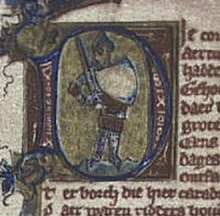| Fergus of Galloway | |
|---|---|
| Lord of Galloway | |
 Fourteenth-century illuminated initial of Leiden University Library Letterkunde 191 (Roman van Ferguut). The knight depicted in the initial may represent an Arthurian character who, in turn, may be named after Fergus himself.[1] | |
| Died | 12 May 1161 |
| Issue |
|
Fergus of Galloway (died 12 May 1161) was a twelfth-century Lord of Galloway. Although his familial origins are unknown, it is possible that he was of Norse-Gaelic ancestry. Fergus first appears on record in 1136, when he witnessed a charter of David I, King of Scotland. There is considerable evidence indicating that Fergus was married to an illegitimate daughter of Henry I, King of England. It is possible that Elizabeth Fitzroy was the mother of Fergus's three children.
Fergus forged a marital alliance with Óláfr Guðrøðarson, King of the Isles through the marriage of the latter to Fergus's daughter, Affraic. As a consequence of this union, the leading branch of the Crovan dynasty descended from Fergus. When Óláfr was assassinated by a rival branch of the dynasty, Galloway itself was attacked before Fergus's grandson, Guðrøðr Óláfsson, was able to seize control of Isles. Both Fergus and his grandson appear to have overseen military operations in Ireland, before the latter was overthrown by Somairle mac Gilla Brigte, Lord of Argyll. The fact that there is no record of Fergus lending Guðrøðr support against Somairle could be evidence of a slackening of Fergus's authority. Contemporary sources certainly report that Galloway was wracked by inter-dynastic strife during the decade.
Fergus's fall from power came in 1160, after Malcolm IV, King of Scotland settled a dispute amongst his leading magnates and launched three military campaigns into Galloway. The reasons for the Scottish invasion are unknown. On one hand, it is possible that Fergus had precipitated events by preying upon Scottish territories. In the aftermath of the attack, the king came to terms with Somairle which could be evidence that he had either been allied with Fergus against the Scots or that he had aided in Fergus's destruction. In any case, Fergus himself was driven from power, and forced to retire to the abbey of Holyrood. He died the next year. The Lordship of Galloway appears to have been partitioned between his sons, Gille Brigte and Uhtred, and Scottish influence further penetrated into Galloway.
- ^ Besamusca (2002) p. 211.